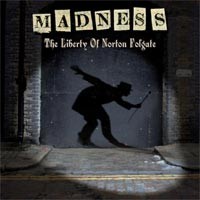Madness were a band vitally important to the UK ska scene of the '70s and '80s, although they did write music which was always more pop-oriented and less politically charged than that of bands like the Specials and the Beat. Silly, giddy hits like "Baggy Trousers," "House of Fun" and "Driving in My Car" garnered the band a more mainstream fanbase and ensured their longevity, proven by the success of Our House the Musical and the current prices of their concert tickets. But despite the band's popularity even now, I missed the announcement that they had released a new album in May of last year. You could argue that the lack of fanfare for this release shows the public are only interested in the band's back catalogue, but this new album was apparently quite good, as I originally came across it through a 'Best of 2009' list on the BBC website.
The Liberty of Norton Folgate (named after a patch of land in the centre of London) opens with "Overture," a nostalgic, brass-based introduction, but as soon as the band starts up with second track, "We Are London," the thick production is evident and jarring. Down-tempo, predictably structured songs come one after another, until we reach "Rainbows," a song which starts to feel more urgent and interesting, but then falls into another chorus which could have fit into any of the previous four tracks and you wouldn't have noticed.
The music is pleasing enough and tries to be uplifting, but everything feels very tame, with vocals lacking any energy, and uninspired, studio-produced instruments tapping away in the background. The Madness of old manages to shine through in parts, such as the piano playing and raspy sax solo on "That Close," but these references to the past are few and far between.
As you move deeper into the 59 minutes of music here, though, the tracks start to grow darker and more creative and the album begins to live up to its concept ambitions. Jaunty oom-pah rhythms become the order of the day, and "Clerkenwell Polka" stands out with its scat singing finale. Then the whole album culminates in the 10-minute title track, foreign musical themes seeping through Suggs' commentary on the multicultural history of the English capital.
The many rave reviews of this album show that it has satisfied a large portion of the Madness fanbase. I imagine this type of fan would be a Londoner who could receive a thrill upon hearing the many references to their native city throughout this album--a fan who grew up with Madness, but whose tastes have mellowed along, expectedly, with the band's sound. Madness's spark and ska influences have certainly dimmed and have been substituted for production and middle-of-the-road songwriting in areas, so don't expect anything like their lively hits of the 1980s. However, you will find a novel idea for a concept album, explored well towards the end.
